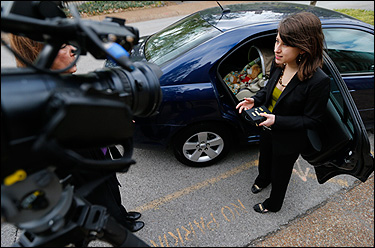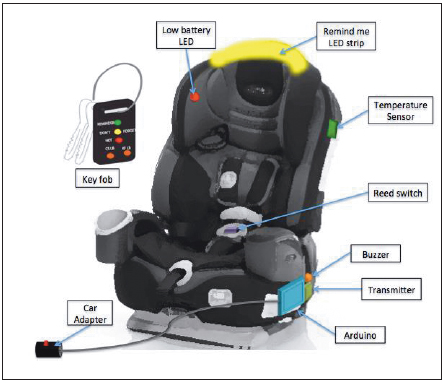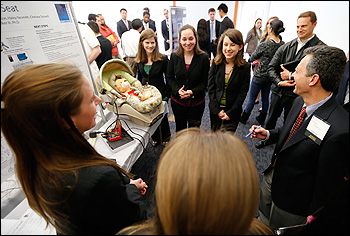
Vanderbilt engineering students are working to prevent children from being left alone in hot cars by creating a ‘smart’ car seat.
As part of a senior design project, six students invented the “Kidsense Car Seat.”
It is powered by a car’s cigarette lighter, and is equipped with lights and alarms to alert parents when the child may be in danger.
Since 1998, 559 children have died from heatstroke in cars, and students believe their device could help prevent future tragedies.
“I hope that this will definitely save children’s lives mainly by preventing the parent from walking away and forgetting the child in the car,” said mechanical engineering student Michelle Goodman.
 The project was displayed along with 67 other inventions as part of Vanderbilt’s Senior Design Day.
The project was displayed along with 67 other inventions as part of Vanderbilt’s Senior Design Day.
The annual event provides students with experience working on real world projects.
“It’s a great way to learn, and it gets exciting when you learn the types of products people can actually use,” said biomedical engineering senior Chelsea Stowell. Other team members are biomedical engineering students Jessica Kim, Laynie Boland and Monica Kruse, who is also majoring in electrical engineering. Haley Nesmith is a mechanical engineering senior.
When a child is placed in the seat, and buckled in, the Kidsense Car Seat lights up blue.
When the car is turned off, a red light comes on, and a key fob vibrates to alert parents the child is still in the seat.
When temperatures inside the car reach dangerous levels, the red lights on the seat flash and an alarm sounds.

Two Arduino microcontrollers gather sensor inputs and trigger alarms in both the car seat and the key fob through RF communication. The smart car seat is differentiated from existing devices by improved ease of use, the temperature detection feature and a graduated alarm system.
The goal is to alert parents to the concern, as well as people who may be walking by the car.
Stowell and members of the team hope the device will one day help save lives.
“No one ever thinks they would intentionally leave a child in the car,” said Stowell. “You don’t want one mistake to cost your child its life.”
Currently, the team has a provisional patent protection for the car seat. They hope to eventually partner with a car seat manufacturer and get the seat into production, and eventually retail stores.